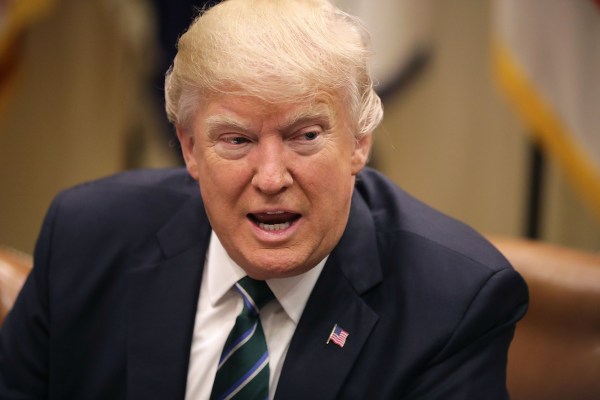Joining an overwhelming chorus that includes most Americans, several major businesses in the U.S. and much of the global community, several investors have come out swinging against President Trump’s decision to withdraw from the Paris Climate Accord.
“I have always believed that, while we can disagree on the scientific premise behind climate change, we should all agree that advanced energy technologies represent one of the biggest economic opportunities,” said General Catalyst managing director Hemant Taneja. “To give that up is a threat to American prosperity… Our American companies will be at a huge competitive disadvantage globally if they don’t have a market to rely on in their backyard.”
That sentiment from Taneja, whose firm manages more than $3 billion, was echoed by other investors across Silicon Valley.
“Trump’s decision to pull out of the Paris Climate Accord is just the latest in an unrelenting series of disastrous policies. Though at this point, the entrepreneurs who I know have shaken off the sense of despair that hung on them in the first months after the election, and are in final-level-boss fight mode,” said Steve Vassallo, a general partner with Foundation Capital (an investment firm with $2.4 billion under management). “Withdrawing the U.S. from the Paris agreement is only going to galvanize cleantech entrepreneurs to work three times as hard to address the dangers of climate change and this presidency.”
A survey from last November by the Chicago Council on Global Affairs indicated that 71 percent of Americans supported the treaty, which created targets for curbing carbon emissions in an effort to reduce their effect on the world’s climate.
“Climate change is real. Burying one’s head in the sand doesn’t change the science,” said Ira Ehrenpreis, a managing partner and co-founder of the Double Bottom Line Venture Partners. “Ironically, this foolish decision is galvanizing a movement from the rest of world and a grassroots groundswell of people who recognize the importance and urgency to act now. It is truly tragic that the U.S. has abandoned its leadership and moral authority on one of the critical issues of our time.”
Over the last few days major corporations from almost every industry have made a concerted effort to convince the president to remain in the treaty.
Salesforce’s Marc Benioff even tweeted an (almost literal) midnight appeal to send a signal to President Trump.
Speaking yesterday from Recode’s conference in California, former Secretary of State Hillary Clinton (and President Trump’s former adversary for the presidency) said that a decision to leave the agreement would hurt U.S. businesses.
Not all investors took a position on the decision. GV (the former Google Ventures) declined to comment on the president’s decision and the National Venture Capital Association said that the organization had no position on the president’s action.
Apparently undeterred by the will of the majority of Americans or the wishes of big business (and his own secretary of state), the president is announcing that he will withdraw from the Paris Climate Accord.
“In order to fulfill my solemn duty to protect America and its citizens the United States will withdraw from the Paris Climate Accord,” the president said from a podium at the Rose Garden of the White House.
The next step for the president and his cabinet is to “begin negotiations that will allow America to re-enter” the Paris Accords under terms that the president deems more fair to U.S. interests.
Also as part of the withdrawal from the agreement, the president committed to withdraw from the $100 billion Green Climate Fund. The U.S. has already provided $1 billion to the fund.
“Exiting the Paris Agreements protects the United States from future intrusions on United States sovereignty,” the president said.
Now what?
So what does all of this mean?
Honestly, not much for businesses. It reinforces the president’s signals that he will privilege fossil fuels like coal and oil over renewable resources. And despite those signals, the move toward renewables will likely persist.
As The Wall Street Journal notes:
The Trump administration’s withdrawal from the Paris Agreement heralds a decisive change in U.S. climate policy, but many corporate leaders say it will have little immediate impact on their investments and strategies.
The reasons are diverse. Companies are responding to customer and shareholder demands to reduce greenhouse-gas emissions. Many large companies operate in states and countries that are implementing climate rules and thus face pressures beyond the U.S. government.
Firms are buying natural gas and renewable electricity that emits less because it is becoming cheaper. And many are making long-term capital investments that will reduce their carbon footprints with an eye toward future decades, not the current election cycle.
Indeed, while investors decried the decision, they admitted that their companies were already prepared for it.
“Most of the folks working around energy and climate no longer seem to require policy support,” said Shaun Abrahamson, a managing partner at Urban Us. “But more than that there seem to be enough businesses and consumers who are committed to climate action. Many of them opposed Trump, so in some ways, supporting startups in these areas will be another form of resistance.”
Ultimately the only consequence of the move is optical and political.
Given the terms of the agreement, the U.S. wouldn’t actually withdraw from the accord until November 2020 (indeed, the first day the U.S. would be free of the accord would be one day after the presidential election).
What the president has done is put a pin in an eventual talking point for the 2020 election and cede any U.S. involvement in global negotiations on climate going forward.
Already the European Union has responded by beginning to embrace China’s overtures toward global treaties and taking a leadership role.
The president closed his speech with an appeal to his base.
“I was elected by voters of Pittsburgh, not Paris. I promised I would exit or renegotiate any deal which fails to serve U.S. interests,” the president said.
And the mayor of Pittsburgh has a response.
